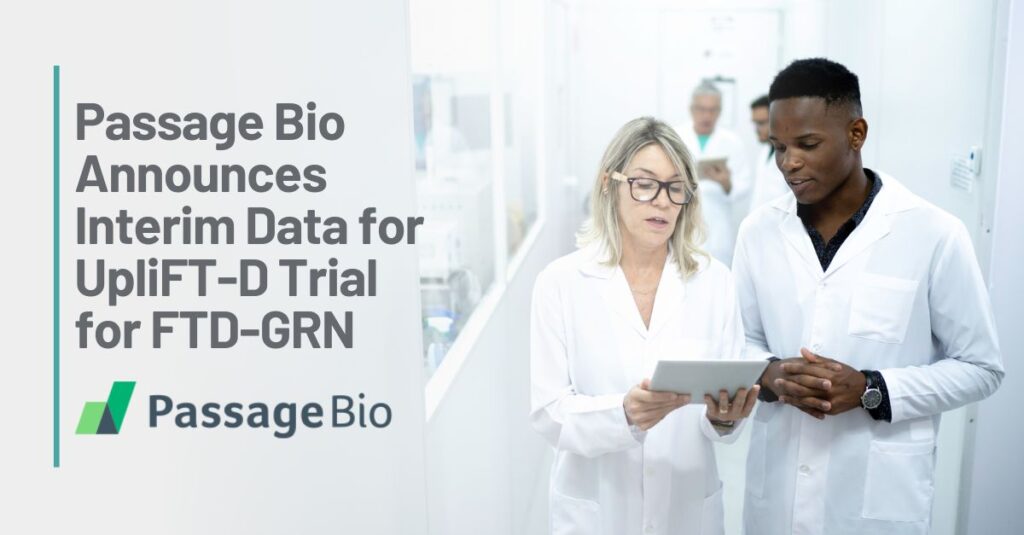Passage Bio Announces Interim Data for UpliFT-D Trial for FTD-GRN

Biotechnology company Passage Bio released interim data for its upliFT-D clinical trial for its gene replacement therapy for FTD-GRN and announced that it is on track to expand the trial to FTD-c9orf72.
Data Shows PBFT02 Increases Progranulin Long-Term
In FTD caused by an inherited GRN genetic mutation, production of the neuroprotective protein progranulin is suppressed, contributing to the buildup of the protein TDP-43, a key driver of FTD pathology. Passage Bio’s experimental therapy PBFT02 seeks to remedy the suppression of progranulin production by re-introducing a working copy of the GRN gene, using an engineered virus known as a “vector” to deliver it.
Passage Bio’s interim data shows PBFT02 consistently increased progranulin levels in cerebrospinal fluid (CSF). At baseline, participants had progranulin levels at three nanograms per milliliter (ng/ml) of CSF – six months after being dosed, participants had progranulin levels ranging around 13-27 ng/ml, and at 12 months, 22-24 ng/ml. While progranulin levels tended to level out around 6 months, they remained consistent through 18 months, the longest follow-up period in the trial so far.
“Given the robust levels of CSF PGRN achieved with Dose 1 and to support future discussions with health authorities regarding the registrational pathway, we look forward to introducing Dose 2, which is fifty percent lower than Dose 1, for subsequent FTD-GRN and FTD-C9orf72 patients,” said Passage Bio president and CEO Will Chou, MD. “We remain focused on advancing the upliFT-D study in each of these patient populations and look forward to sharing additional data in the second half of 2025.”
Passage Bio plans to split the second cohort of participants between the original higher dose and Dose Two, with three of the five people in Cohort Two receiving the lower dose. The study is actively enrolling for treatment at Dose Two, and following Cohort Two, the company plans to continue enrollment in the optional Cohort Three. U.S.-based trial sites in Philadelphia and Houston are recruiting participants.
Passage Bio is also preparing to expand upliFT-D to FTD caused by c9orf72 genetic mutations, with the company announcing that it has amended the trial protocol to include a pair of cohorts of people with FTD-c9orf72. The cohorts will each consist of up to five participants who will initially receive the lowered Dose Two. The amendments to the study protocol are under review, but the company noted that it remains on track to dose the first participant in the first half of 2025.
Signing up for the FTD Disorders Registry can not only help you keep up to date on participation opportunities for trials like upliFT-D, but it also lets you share your lived experiences with researchers to guide their work. Are you curious about what signing up for a trial entails? Reach out to AFTD’s HelpLine at 1-866-507-7222 or info@theaftd.org
By Category
Our Newsletters
Stay Informed
Sign up now and stay on top of the latest with our newsletter, event alerts, and more…
